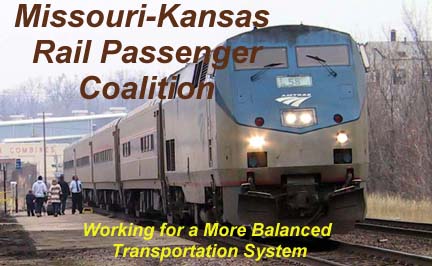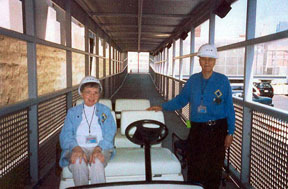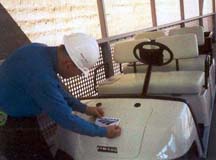 |
Fall 2003
Box
1183, Mission, KS 66202-1183
trainweb.org/moksrail
|
||
House & Senate to reconcile funding bills
By
the end of October, Congress is set to decide the future of long-distance
intercity rail transportation in the U.S. Events change quickly. By the time
this news is released, another development will break.
The Senate approved $1.4 billion for Amtrak. At a Senate subcommittee mark-up, Chairman
Richard Shelby (R.-Ala.) lamented giving Amtrak a funding increase when he said
its ridership has not grown in 25 years ("like other modes").
According to the National Association of Rail Passengers, that statement
ignores the fact that increased funding should be a pre-cursor to not a
reward for higher ridership. Though ridership dipped slightly from 2001 to
2002, it is higher than at any previous point since at least 1988. Adjusted for
inflation, Amtrak funding has been cut by more than a third since 1982
at the same time the federal government has doubled highway funding and tripled
aviation funding.
The House approved only $900 million in Amtrak
funding, more than what the Bush Administration was proposing but half of what
Amtrak CEO David Gunn said is needed to restore equipment and maintain service.
Gunn has called the $900 million a shutdown budget.
ANTI-AMTRAK AMENDMENTS DEFEATED: On a positive note out of
the House, representatives, except Jim
Ryun, Republican from Topeka,
Kan., defeated 130-282 an amendment that
would have prohibited the use of federal funds on
routes with an FY 2001 operating ratio over 2.0.
(Operating ratio is costs
divided by revenues, so an operating ratio over 2.0 means a
revenue-to-cost ratio of under 50%.) The amendment
would have also applied to two
short-distance routes (Chicago-St.
Louis and Chicago-Milwaukee) as well
as all but six long-distance routes, including the Texas Eagle and California
Zephyr, but not the Southwest Chief. Had that amendment
passed, it would have crippled Amtrak’s already skeletal national system.
Earlier in the year, the Bush Administration singled
out the Southwest Chief and
the Texas
Eagle, as well as only a few other long-distance trains, that it would
like to see discontinued, citing high per-passenger losses. Different trains,
using different criteria, are targeted when critics go after Amtrak.
OLD DATA CITED.
The amendment used the final 2002 Amtrak Reform Council report, fully
allocated costs from FY 2001. Overhead costs, such
as part of the CEO's salary, would not disappear with a given
route but simply be shifted to surviving routes.
Please see following page.
Amtrak funding, continued.
HOW
YOUR CONGRESSMEN VOTED: Most Kansas congressmen voted against the
Amtrak-killing budgets; Ryun,
however, was a clear exception, voting three times against Amtrak. Rep. Todd Tiahrt, a Wichita Republican,
voted negative on one vote, but positive on another. Reps. Jerry Moran, western Kansas Republican and Dennis Moore, a Johnson County Democrat, consistently voted in
favor of Amtrak.
MISSOURI: Reps. Sam Graves,
northwest Missouri and Kansas City, Todd
Aiken, St. Louis, both Republicans, consistently voted against Amtrak
funding.
Rep. Roy
Blunt, a Republican from Joplin, voted against Amtrak on two out of the
three votes. Rep. Kenny Hulshof, of
east-central Missouri, voted only once against Amtrak.
Reps. William Lacy Clay, St. Louis, Ike Skelton, west-central Missouri, and Karen McCarthy, Kansas City, both Democrats, joined Republicans Jo Ann Emerson, Cape Girardeau, and Kenny Hulshof, northeast Missouri, in voting mostly for Amtrak.
If
any of the three amendments had passed,
Kansas
no longer would have had passenger
rail
service. Missouri would have lost its two long-distance trains, the Southwest
Chief and the Texas
Eagle.
“It
appears Rep. Ryun is willing for your tax dollars to support rail service along
the Northeast Corridor and along portions of the West Coast, while the
heartland he is supposed to represent has no service,” wrote MOKSRail President John Mills, in a
letter to the editor to the Topeka Capital-Journal as well as to Kansas’
congressional delegation.
Fortunately,
several Republican senators, breaking from the administration, introduced the American Rail Equity Act, S. 1505,
which preserves the national rail passenger system.
Please
urge your elected officials to support the bill and oppose Bush’s “Passenger Rail Investment Reform Act,” S.
1501, a weak “reform” bill that pushes Amtrak costs to financially-strapped
states. That proposal would also gut long-distance trains, funding only narrow,
regional corridor services.
“This
concept proposed by the Bush Administration would fragment the present
system. It must be killed in committee
and not even reach the Senate floor,” said Mills.
REP. MOORE COMES THROUGH
Congressman Moore, who represents
Johnson, Wyandotte, Douglas and other eastern Kansas counties, Aug. 14 wrote
MOKSRail vice president Doug Ohlemeier this response:
I believe that, in light of the tragic events of September 11, 2001,
having a national transportation infrastructure
like Amtrak is even more essential to our homeland defense. The U.S.
government should take the lead in making Amtrak a fully functioning,
attractive alternative to driving and air travel. The fact that Amtrak
has never turned a profit is not unique; there are no operating passenger trains
anywhere in the world that turn a profit
without some form of subsidization from the government.
I recently signed a letter to House appropriators
asking that they appropriate $1.812 billion
in FY 2004 so Amtrak can invest in the infrastructure, repair damaged
equipment and operate the railroad. Amtrak's new president David Gunn
has done a remarkable job in turning the railroad around during his first year
at the helm; I feel Congress should give him the resources he needs to
finish the job.
Amtrak’s
fare box recovery box is 68% compared to, for example, the Topeka Transit
system, which covers only 16% of its costs. User fees, gasoline taxes,
licensing charges, etc., fund only 59% of highway operating costs. This does
not include the extensive court system and state patrol.
The
Federal Aviation Air Traffic Control system, which costs $3 billion a year to
operate, is funded by general tax revenues, not so-called “user fees.” No
airline, even Southwest, makes a profit, if judged by the carriers that
accepted Sept. 11 bailout money and federally-funded airport infrastructure
costs.
For
the latest developments, visit www.narprail.org. Please continue to contact your
congressional representatives and urge them to properly fund Amtrak to maintain
a balanced transportation system.
An electric cart that MOKSRail members helped fund
is now in operation at Amtrak’s new passenger station inside Kansas City Union
Station.
MOKSRail
members,
along with a donation from the Kansas City chapter of the National Railroad Historical Society, contributed $1,858. The Missouri Department of Transportation
contributed $2,999.
The cart transports disabled passengers from the
waiting room area down the long walk to the elevator that takes passengers to
the trains
at
ground level.
The cart has a three-person capacity, plus luggage and a driver.
“It’s nice, big
and roomy,” said MOKSRail member Dick
Williams, who recently observed the cart. “The
Yamaha has the Amtrak logo on the front and a
baggage carrier on the back. It’s a long walk to the train so I’m sure everyone
with mobility problems is glad it’s there. This is the sort of thing they
take for granted and should have available at a major station stop like Kansas
City.”
 |
 |
||
MOKSRail officers Pete & Carolyn McMasters inspect the new
cart. Pete places the Amtrak logo on the cart.
Former Kansas City mayor Emanuel Cleaver had Carolyn and
Pete McMasters, MOKSRail founders
and secretary and treasurer, appear on his weekly Under the Clock radio show, broadcast live on KCUR-FM, from Kansas
City Union Station. The July 18 show focused on Amtrak.
Cleaver included an audio segment of a train trip he
took to Warrensburg. He included pro-rail comments from passengers. “It's a relaxing service. It's part of
America. We would hate to see this service end,” passengers said.
Cleaver also interviewed Ray Lang, Amtrak’s director of governmental affairs, who explained
funding. He said the House of Representatives allocated almost nothing for rest
of country, outside of NEC and West Coast. “It's insufficient,” he said. “We
would run out of money and the system would shut down shortly into the fiscal
year. It would be a very chaotic shutdown.”
Cleaver told his listeners, “If we're finding out
what Amtrak is having to deal with, maybe people could communicate that to our
elected officials in Washington.”
While the national air system was shut down for
three days, Lang noted how Amtrak was down for only two hours. He stated
that immediately after Sept. 11, the federal government gave billions of
dollars to airlines while Amtrak, hurt like every other transportation entity,
received nothing.
Please see following page.
Under the Clock Amtrak radio show, continued.
Cleaver asked if this was because Amtrak doesn't
have the heavy, high-octane lobbyists that causes insufficient funding.
“Contractors lobby Congress for highway construction. Who is there to protect
the interest of the travelers by train? Members of Congress don’t see a
constituency for Amtrak, so they can afford to ignore it,” he stated.
The former nationally renown leader, who was once
being considered for a Clinton Administration cabinet post, also said one of
the reasons Kansas City covered up the rails in downtown was because the bus
lobbyists convinced the city and state leaders that “the best thing America
had going for it was the new bus system. So we covered it up.”
Cleaver noted that if Amtrak shuts down, “There are
small cities that don’t have other transportation systems may fall off the
map.” Carolyn McMasters noted how many of the towns in western Kansas along the
Amtrak line would be further isolated if they were to lose train service.
Cleaver invited his listeners who hadn’t ever ridden Amtrak out of Union Station to take a trip.
MOKSRail was represented at a Rail Summit, held
Sept. 13 in Lincoln, Neb. Doug Ohlemeier, MOKSRail vice president, attended the
meeting that was sponsored by ProRail Nebraska.
“Passenger rail is the weakest link in our transport
system,” Laura Kliewer, a senior policy analyst with the Council of State
Governments, Lombard, Ill., told attendees.
The Midwest
Interstate Passenger Rail Compact, formed by Midwestern states to start
higher-speed rail service, projects the service will attract 8 million riders a
year, making rail service almost as popular as regional air travel. Incremental
high-speed rail costs $1 million a mile, less than one-tenth the cost of
highway construction, she said.
Rick Harnish, executive director of the Midwest High Speed Rail Coalition, said
the goal is to create a strong network of reliable, auto-competitive trains.
“In everything we do, there are choices, except transportation,” he said.
The reason rail service doesn’t work in the Midwest,
he said, was because no one has put any money into it.
Rail travel alternatives are important, since most
people don’t live near an airport. “Try buying an air ticket from Peoria, Ill.,
to Glenwood Springs, Colo.,” he said.
The California
Zephyr, which runs through Nebraska and Iowa from Chicago to the San
Francisco area, has 350 coach seats compared to a typical Southwest Airlines’
137-seat jet. Adding a second Zephyr
frequency, about 12 hours opposite of its current schedule, will drive volume.
“The train has such nice, wide seats. You can’t even touch the seat ahead of
you,” Harnish said.
Congress, through the Amtrak Reform Council, forced
Amtrak to lie about its accounting for five years. Once you remove its overhead, such as NEC
costs, trains such as the Zephyr make excellent cost recovery, Harnish said.
The high speed rail coalition is trying to get higher-speed Chicago- St. Louis trains running
so rail supporters can forever dispel the myth that passenger rail only works
on the East and West Coasts, Harnish said.
Nebraska and Iowa advocates are working with their state legislatures and the coalition to get higher-speed trains
between Chicago and Lincoln, through Des Moines and Omaha. Missouri is a member of the compact.
Like other areas, rail advocates from Iowa and
Nebraska that attended the meeting, along with area political leaders such as
city council members, worry that dismantling Amtrak will hurt future intercity
rail service.
___________________________________________________________________________________________
Should you have material you would like to contribute to this newsletter, or to the Web site, contact vice president and newsletter editor/ webmaster Doug Ohlemeier at 800-255-5113 x375 or ohlemeier@netzero.net